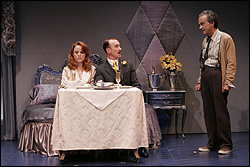I sat through all of Jumpers (playing through Sunday, Sept. 19, at ACT Theatre, 206-292-7676) so you won’t have to. You can thank me later.
I’ll tell you what doesn’t work about director Jeff Steitzer’s neurasthenic production of the 1972 Tom Stoppard comedy, but first I’d just like to put this out there in case you’re thinking, Well, it may be a flawed production, but it’s Tom Stoppard, isn’t it?: The show will bore you. I know it’s Tom Stoppard, and Tom Stoppard is a cause for celebration, but you simply will not enjoy yourself. The show is long, it’s misshapen, and it misses at least half the jokes in the script—and most of the jokes it does get right are accompanied by this weary sense that they’d be a lot funnier if you were watching a better production.
David Pichette plays George Moore, a professor whose preparation for a debate on the existence of God coincides with his retired actress wife’s implication in the murder of the acrobat who’s hanging in her closet—and her simultaneous anxiety that the presence of men on the moon will only serve to increase the moral uncertainties of the universe. This culminates in the death of George’s rabbit and a mock trial in which Tarzan is a key witness. It’s dense and screwy, and there’s something boisterous and beautiful at work in it— a thunderously comic melancholy that wants us to be bonded in our aloneness, to feel both humbled and emboldened by what we don’t know. But it shouldn’t feel like work; Steitzer’s production feels like 65 years on the job with no hope of retirement.
It falls on Pichette’s shoulders to carry the first act, which, despite interruptions from George’s dissembling wife, Dotty (Erika Rolfsrud), and some acrobats in yellow bodysuits, is mostly a discursive lecture titled “Man: Good, Bad, or Indifferent?” The speech and its absurdist distractions are a Monty Python wet dream, a chance to commingle sideways slapstick with head-on symposia. Steitzer, unfortunately, doesn’t provide enough shtick to keep things cracking (poor Julie Briskman is left out to dry in a wordless, thankless turn as George’s secretary), and it’s apparently all Pichette can do to get the dialogue out. It’s probably only fair to say that Stoppard, however magnanimously, has overwritten to a fault, and the enormous demands of the role bring out Pichette’s worst tendencies. British verbosity makes him tense and sputtery in a way that’s exhausting to watch; I haven’t seen him this pinched since he came up against the patter songs as Higgins in the 5th Avenue’s My Fair Lady. Rolfsrud hooks rather fetchingly into Dotty’s existential despair, and John Patrick Lowrie complements her as the dunderhead policeman devoted to her, but the energy evaporates whenever the focus is thrown back in Pichette’s direction.
Act Two is a trifle less painful, because Stoppard goes careening into divinely ridiculous territory and R. Hamilton Wright does ridiculous well. Playing Archie, a university dean, doctor, and head of Dotty’s personal cleanup brigade, Wright comes onstage to calmly claim that the murdered acrobat simply climbed into a large yellow bag of his own volition and shot himself. “Why?” asks George, confused by the idea that the acrobat, an atheist and his intellectual rival, would ever commit suicide. “It’s hard to say,” replies Archie. “He was always tidy.” This is prime Stoppard nonsense, and Wright’s placid wit plays right into it, giving the production whatever lift it has.
There isn’t enough, alas, of that loony buoyancy. When Tarzan and company finally arrive for the surreal philosophy trial, and Dotty floats in on a moon crooning her own version of “Sentimental Journey,” it seems less that Stoppard is having a ball than that Steitzer has lost his marbles—it’s just a mess of staging.
Much of George’s lecture concerns itself with the relative nature of the word “good”—the word means what it means solely according to whoever’s using it. Relatively speaking, then, this Jumpers is not good.








